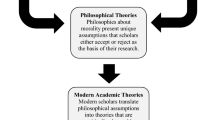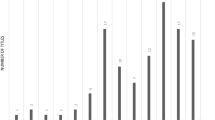Abstract
This paper begins by summarizing and distilling MacIntyre’s sweeping critique of modern business. It identifies the crux of MacIntyre’s critique as centering on the fundamental Aristotelian concepts of internal goods and practices. MacIntyre essentially follows Aristotle in arguing that by privileging external goods over internal goods, business activity – and certainly modern capitalistic business activity – corrupts practices. Thus, from the perspective of virtue ethics, business is morally indefensible. The paper continues with an evaluation of MacIntyre’s arguments. The conclusion is drawn that MacIntyre’s critique, although partially valid, does not vitiate modern business as he claims. In short, modern business need not of necessity be antithetical to individuals’ pursuit of internal goods within practices.
Similar content being viewed by others
References
Baumaol W. J., R. E. Litan, C. J. Schramm, 2007, Good Capitalism Bad Capitalism. New Haven: Yale University Press
Chytry, J.: 2007, ‹Organizational Aesthetics: The Artful Firm and the Aesthetic Moment in Contemporary Business and Management Theory’, Working Paper, University of California, Berkeley
Frazer E., N. Lacey 1994, MacIntyre, Feminism and the Concept of Practice, in J. Horton, S. Mendus, (eds.), After MacIntyre: Critical Perspectives on the Work of Alasdair MacIntyre. Notre Dame: University of Notre Dame Press
Friedman, B. 2005, The Moral Consequences of Economic Growth. New York: Knopf
Hart, S.: 2007, Capitalism at the Crossroads (New Jersey: Wharton School Publishing)
Jensen, M. C.: 2001, ‹Value Maximization, Stakeholder Theory, and the Corporate Objective Function’, Social Science Research Network Electronic Paper Collection
Keat, R.: 2007, ‹Ethics, Markets and MacIntyre’, Paper for the Conference on Alasdair MacIntyre’s Revolutionary Aristotelianism, HRSJ Research Institute, London Metropolitan University, 29th June to 1st July
Klein, S.: 1988, ‹Is a Moral Organization Possible?’, Business & Professional Ethics Journal 7(1), 51–73
Krech, I. I. I. S.: 1999, The Ecological Indian (New York: Norton paperbacks)
Kreps, D. (1997) Intrinsic Motivation and Extrinsic Incentives. The American Economic Review, 87(2), 359–364
Layard, R. 2005, Happiness: Lessons from a New Science. New York: Penguin Press
MacIntyre, A. 1977, Utilitarianism and Cost-Benefit Analysis: An Essay on the Relevance of Moral Philosophy to Bureaucratic Theory, in K. Sayre, (ed.), Values in the Electric Power Industry. Notre Dame: University of Notre Dame Press
MacIntyre, A. 1979, Corporate Modernity and Moral Judgment: Are They Mutually Exclusive?, in K. E. Goodpaster, K. M. Sayer, (eds.), Ethics and Problems of the 21st Century. Notre Dame: University of Notre dame Press
MacIntyre, A. 1982, Why are the Problems of Business Ethics Insoluble, in B. Baumrin, B. Friedman, (eds.), Moral Responsibility and the Professions. New York: Haven Publishing
MacIntyre, A. 1984, After Virtue, 2nd ed. Notre Dame: University of Notre Dame Press
MacIntyre, A. 1994, A Partial Response to my Critics, in J. Horton, S. Mendus, (eds.), After MacIntyre: Critical Perspectives on the Work of Alasdair MacIntyre. Notre Dame: University of Notre Dame Press
MacIntyre, A. 1999a, Dependant Rational Animals. Illinois: Open Court Publishing
MacIntyre, A. (1999b). Social Structures and Their Threat to Moral Agency. Philosophy (London, England), 74(289), 311–329
Roberts, J. 2004, The Modern Firm: Organizational Design for Performance and Growth. Oxford: Oxford University Press
Schwartz, B.: 1990, ‹King Midas in America’, in C. C. Walton (ed.), Enhancing Business Ethics (Plenum Press, New York)
Sen, A.: 1997, ‹Maximization and the Act of Choice’, Econometrica 65, 745–779
Solomon, R. C. (1992). Corporate Roles, Personal Virtues: An Aristotelian Approach to Business Ethics. Business Ethics Quarterly, 2, 317–339. doi:10.2307/3857536
Author information
Authors and Affiliations
Corresponding author
Rights and permissions
About this article
Cite this article
Dobson, J. Alasdair Macintyre’s Aristotelian Business Ethics: A Critique. J Bus Ethics 86, 43–50 (2009). https://doi.org/10.1007/s10551-008-9792-2
Received:
Accepted:
Published:
Issue Date:
DOI: https://doi.org/10.1007/s10551-008-9792-2




